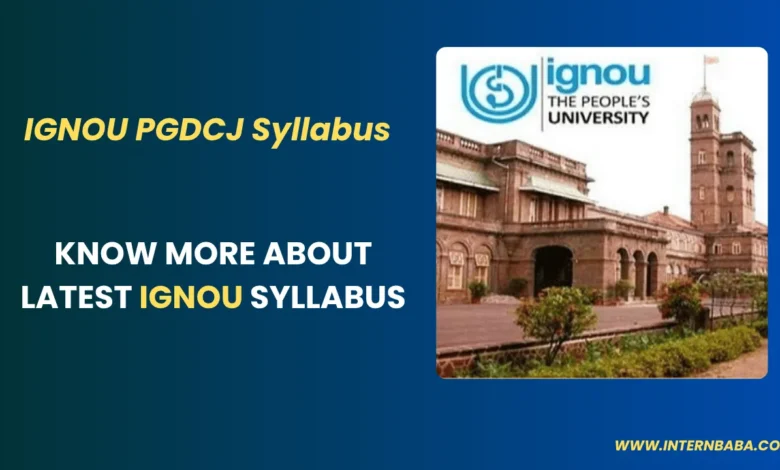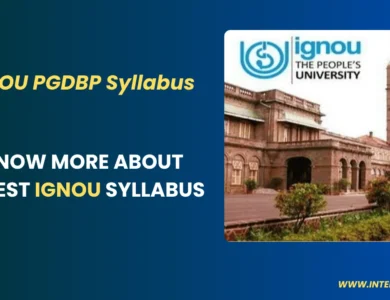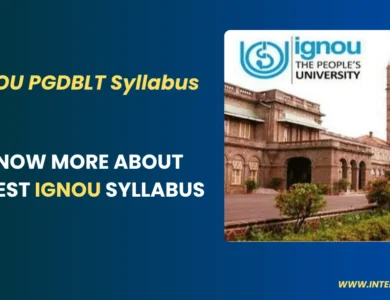IGNOU PGDCJ Syllabus 2025

If you’re planning to pursue a Post Graduate Diploma in Criminal Justice (PGDCJ) from IGNOU, understanding the syllabus is your first step towards success. The IGNOU PGDCJ programme is designed to provide a comprehensive understanding of the Indian criminal justice system, catering to both fresh graduates and working professionals. With its blend of theory and practice, it offers a flexible and accessible route into the legal and justice sectors. In this detailed guide, we cover everything you need to know about the IGNOU PGDCJ syllabus for 2025, including course structure, credit requirements, and career prospects.
Whether you’re seeking to enhance your career, prepare for advanced legal studies, or gain a solid foundation in criminal justice, the PGDCJ programme from IGNOU can provide the knowledge and skills you need. IGNOU’s commitment to open learning and academic excellence ensures that students from across India can benefit from high-quality education regardless of location.
Overview of IGNOU PGDCJ Programme
The PGDCJ programme at IGNOU is an annual-based diploma course that imparts knowledge of criminal justice, legal systems, and penal codes. It follows a credit system where students must earn a total of 32 credits to qualify for the diploma. This structured yet flexible format makes it suitable for students from various backgrounds.
| Feature | Details |
|---|---|
| Programme Name | Post Graduate Diploma in Criminal Justice |
| Total Credits | 32 |
| Exam Type | Annual |
| Programme Category | PGDCJ |
IGNOU’s distance education model ensures that even students with full-time jobs or family responsibilities can complete this diploma without disrupting their current commitments. The learning materials are self-explanatory and supported through a network of study centers.
IGNOU PGDCJ Syllabus Structure 2025
The syllabus is designed to address key components of the criminal justice system in India. It includes core theoretical papers and a practical project component. All courses are mandatory.
Syllabus Breakdown
| Course Code | Course Name | Credits |
| MLE-11 | Criminal Justice System | 4 |
| MLE-12 | Indian Penal Code | 4 |
| MLE-13 | Criminal Justice Processes | 4 |
| MLE-14 | Criminal Justice Administration | 4 |
| MLE-15 | Challenges to Criminal Justice System | 4 |
| MLE-16 | Criminal Justice Research and Advocacy | 4 |
| MLEP-17 | Project Work | 8 |
| Total | 32 |
These subjects offer students a balanced mix of theoretical grounding and practical understanding, ensuring they are equipped to engage with real-world legal issues and reforms.
Understanding the Credit System
Each subject in the PGDCJ programme carries a specific credit value. You need to complete all seven subjects to earn the required 32 credits. IGNOU’s credit system offers flexibility in study pace and workload distribution. However, it’s essential to complete each subject successfully to qualify for the diploma.
Each credit at IGNOU represents 30 hours of study, which includes reading material, assignments, and examination preparation. With this model, students can plan their study schedule effectively across the academic year.
IGNOU regularly updates the syllabus to align with current legal standards and student needs. Always refer to the official IGNOU website or consult your regional center for any recent changes.
Course Objectives and Learning Outcomes
The key objectives of the PGDCJ programme include:
- Building foundational knowledge of the criminal justice system.
- Equipping students with skills to analyze legal issues critically.
- Enabling comprehension of Indian penal laws and their applications.
- Providing hands-on experience through project-based learning.
- Preparing students for legal, research, and administrative roles.
The course also emphasizes ethical understanding and encourages students to reflect on the moral implications of law enforcement and justice administration. By the end of the programme, students will possess a strong understanding of crime, law enforcement, legal procedures, and justice administration in India.
Eligibility and Career Opportunities
Eligibility Criteria:
- Bachelor’s degree in any discipline from a recognized university.
No prior legal education is required, making this course accessible to a wide range of students.
Career Scope:
- Legal advisors and consultants
- Police and law enforcement personnel
- Judicial clerks and support staff
- NGO workers and social justice activists
- Legal researchers and policy makers
- Crime analysts and investigative journalists
PGDCJ enhances the professional profile of individuals working in legal environments or those looking to enter the field. It also serves as a stepping stone for those who wish to pursue LLB or other advanced legal studies.
Benefits of Choosing IGNOU for PGDCJ
- Study at your own pace with a flexible annual system
- Course recognized by UGC and valid across India
- Affordable fee structure
- Emphasis on practical and research-based learning
- Strong support through regional and study centers
- Access to a rich collection of study material and digital resources
- No age restriction for enrollment
IGNOU’s robust student support system and wide network of study centers make it easier for students to seek guidance and complete their coursework on time.
Frequently Asked Questions (FAQs)
Q1. Can I pursue PGDCJ without a law background?
Yes, the programme is open to all graduates regardless of academic background. It’s suitable for anyone interested in criminal justice and legal studies.
Q2. What is the duration of the PGDCJ course?
The minimum duration is 1 year, and students have up to 3 years to complete the course, offering flexibility for working professionals and part-time learners.
Q3. Does the programme include project work?
Yes, MLEP-17 is a mandatory project carrying 8 credits. This helps students gain research and analytical skills by working on real or simulated criminal justice issues.
Q4. Are there elective courses?
No, all listed courses are compulsory. The curriculum has been carefully designed to cover all essential aspects of criminal justice.
Q5. Does IGNOU offer placement support?
While IGNOU doesn’t provide direct placement services, the diploma enhances your resume for jobs in legal, administrative, and research sectors. Many students benefit from the credibility and recognition that IGNOU qualifications carry.
Final Thoughts
The IGNOU PGDCJ programme is an excellent choice for those aiming to build a career in criminal justice, law enforcement, or related sectors. With its practical curriculum, project work, and flexible format, it opens up diverse career opportunities. Whether you’re starting your journey or enhancing an existing legal career, this diploma provides a strong academic foundation.
Make sure to review IGNOU’s official updates regarding admission deadlines, study center locations, and the latest academic announcements to stay on track. Success in the PGDCJ programme requires dedication and consistent study, but the rewards in terms of knowledge, skills, and career advancement are well worth the effort.
For more information, visit IGNOU Official Website or contact your nearest IGNOU study center.







